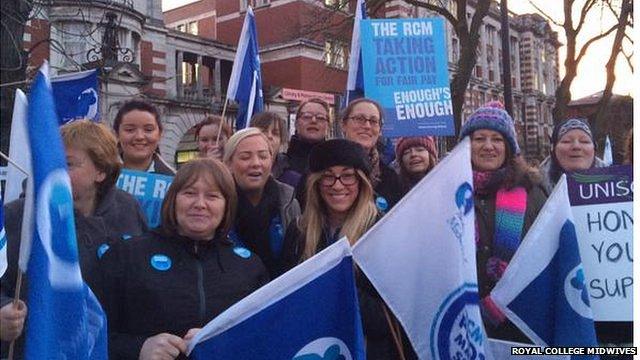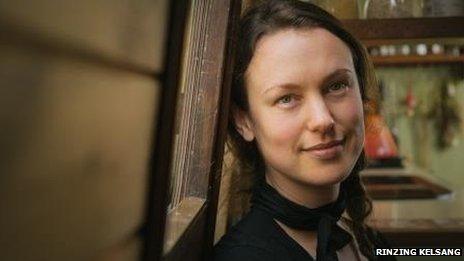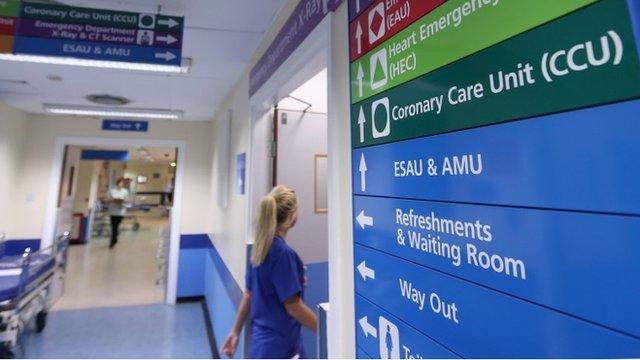NHS staff stage four-hour strike
- Published

Midwives at picket lines in central Manchester
NHS workers, including nurses, midwives and ambulance staff, have staged a four-hour strike in England as part of a pay dispute.
They were protesting about the decision not to implement a 1% rise for all staff recommended by a pay review body.
Members of nine unions walked out at 07:00 GMT in England and at 08:00 GMT in Northern Ireland.
A Department of Health spokesman said it could not afford the rise without risking frontline jobs.
Non-urgent care
Unions said the industrial action would not have affected urgent care, although pre-booked outpatient appointments and non-emergency surgery and operations may have been delayed.
Out of some 450,000 staff who were due to be at work today, NHS England estimates around 12,500 were absent - meaning about one in 35 staff took part in the strike.

Nick Triggle, health correspondent, BBC News
The words strike and NHS are enough to send a shudder down the spine of any patient.
But many of the people using the health service in England or Northern Ireland on Monday morning may not have noticed a huge difference.
Why? Walkouts in the NHS are quite different from other sectors. When tube drivers, council staff or teachers strike the aim is to cause disruption. It is the first rule of industrial action: make your contribution count.
However, the terms of engagement are somewhat different when NHS workers take part. While unions members want to make a point, they commit to not harming urgent and emergency services.

Unison said there had been a picket line at every acute hospital and ambulance station in England, as well as action at many community health organisations.
And some staff who turned up to work would have had exemptions from strike action to ensure emergency care was provided.
Independent review
Dave Prentis, general secretary of Unison, told the BBC: "Really it is to get over a message to the public about what is happening and to get the message to the government about the importance of our members providing our health services.
"An independent pay review body that looks at public service workers recommended a 1% increase in line with the government's own pay policy.
"But the secretary of state reneged on it.
"The effects on morale has been absolutely dreadful. The feel they are not wanted, they have had no pay increase for four years and now an independent body has been ignored."
Unison's Dave Prentis: "They've been offered a measly 1% and it's been reneged on"
The strike will be followed by up to six days of work-to-rule. Measures will include members claiming pay for extra hours or refusing to work overtime. And staff will take all breaks to which they are entitled.
The decision follows a four-hour strike on 13 October, the first in the NHS over pay for 30 years.
Thousands of healthcare workers took part but disruption was minimised after the seven unions involved agreed staff would ensure emergency and urgent care were covered.


Anna has been a midwife for five years
Case study: Anna Kent, 33, midwife
Anna picketed outside City Hospital in Nottingham.
"I was quite nervous about striking as it is not something that comes naturally to me - it was a last resort. But I am absolutely humbled by the amount of public support we have had.
"I just don't know what else we can do. A lot of my colleagues are getting paid less this year than last year even though they are more experienced.
"For me, it's not actually about the money. It is the inequality between people in power and people on the ground. I feel undervalued. I love my job but it is not sustainable to work 13 hours with no break and get a pay cut. This is about feeling valued."

Two further unions backed the second round of strikes.
The nine unions involved represent more than 400,000 staff and include:
Unison
Royal College of Midwives
Union of Construction, Allied Trades and Technicians
Society of Radiographers (strike action between 08:00 and 12:00)
British Association of Occupational Therapists
GMB
Unite
Managers in Partnership
Prison Officers Association
Members of the British Dietetic Association and Hospital Consultants and Specialists Association are considering taking part in action short of strike action from 25-30 November.
Doctors and staff with the Royal College of Nursing were not part of this strike action.
Pay award
Ministers in England have awarded NHS staff a 1% increase, but only for those without automatic progression-in-the-job rises.
Automatic pay rises are given to about half of all staff. They are designed to reward professional development and are worth 3% a year on average.
An independent pay review board had said the 1% increase should be across the board.
It was implemented in full in Scotland. Northern Ireland has yet to make a decision on pay. Trade unions in Wales accepted a two-year pay deal set out by the government this month.
.jpg)
The Royal College of Midwives said thousands of staff were on the picket lines
A Department of Health spokesman said: "NHS staff are our greatest asset and we want to make the current pay system fairer - which is why we have put forward proposals that would guarantee all staff would get at least a 1% pay rise this year and next, but these have been rejected by the unions.
"We have taken tough decisions to increase the NHS budget, but we can't afford a consolidated pay rise in addition to increments without risking 10,000 frontline jobs."
A spokesperson for the Royal College of Midwives, said: 'We are seeing overwhelming support from our members across England for this industrial action and thousands of them are right now out on the picket lines.
"They know they have the support of the public and at the end of the day they are simply asking for a very modest 1% pay award.
"Momentum is building and those denying NHS workers a pay award need to now that midwives and other NHS staff are determined to continue."

- Published30 October 2014

- Published24 November 2014